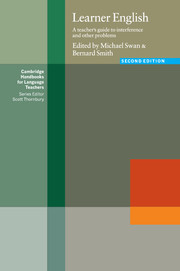Book contents
- Frontmatter
- Contents
- Notes on contributors
- Introduction
- Note for teachers of American English
- List of phonetic symbols
- Acknowledgements
- Dutch speakers
- Speakers of Scandinavian languages
- German speakers
- French speakers
- Italian speakers
- Speakers of Spanish and Catalan
- Portuguese speakers
- Greek speakers
- Russian speakers
- Polish speakers
- Farsi speakers
- Arabic speakers
- Turkish speakers
- Speakers of South Asian languages
- Speakers of Dravidian languages
- Speakers of West African languages
- Swahili speakers
- Malay/Indonesian speakers
- Japanese speakers
- Chinese speakers
- Korean speakers
- Thai speakers
- The cassette and CD
- References
Speakers of Dravidian languages
- Frontmatter
- Contents
- Notes on contributors
- Introduction
- Note for teachers of American English
- List of phonetic symbols
- Acknowledgements
- Dutch speakers
- Speakers of Scandinavian languages
- German speakers
- French speakers
- Italian speakers
- Speakers of Spanish and Catalan
- Portuguese speakers
- Greek speakers
- Russian speakers
- Polish speakers
- Farsi speakers
- Arabic speakers
- Turkish speakers
- Speakers of South Asian languages
- Speakers of Dravidian languages
- Speakers of West African languages
- Swahili speakers
- Malay/Indonesian speakers
- Japanese speakers
- Chinese speakers
- Korean speakers
- Thai speakers
- The cassette and CD
- References
Summary
Distribution
SOUTH INDIA, SRI LANKA, SINGAPORE, Malaysia, Indonesia, East and South Africa, Mauritius, Burma, Vietnam, Guyana, the Caribbean; there are Tamil-speaking communities in many other parts of the world.
Introduction
Many of the problems faced by speakers of Dravidian languages when they learn English are shared with speakers of other South Asian languages. For details of these, see pages 227–243. However, Dravidian languages are agglutinative languages, like Turkish; they differ radically in their phonology, morphology and syntax from the Indo-European languages of the subcontinent, and have correspondingly less in common with English than these languages. Speakers of Dravidian languages therefore encounter a number of additional problems when learning English. This chapter deals with the English of Tamil-speaking learners, but the points made are generally valid for speakers of other Dravidian languages.
Phonology
Vowels
The Tamil vowel system consists of five pairs of short and long vowels: /Λ/, /ɑ/; /i/, /iː/; /e/, /eː/; /o/, /oː/, /u/, /uː/.
All the vowels are undiphthongised, though raised or lowered in context. The two vowels /oː/ (a pure close rounded short vowel) and /oː/ (the long equivalent) have no close counterparts in standard British English, though similar vowels occur in Scottish, Irish and other regional varieties.
There are two diphthongs: /ai/ (like the vowel in buy) and /a℧/ (like the vowel in cow).
- Type
- Chapter
- Information
- Learner EnglishA Teacher's Guide to Interference and Other Problems, pp. 244 - 250Publisher: Cambridge University PressPrint publication year: 2001
References
- 1
- Cited by



